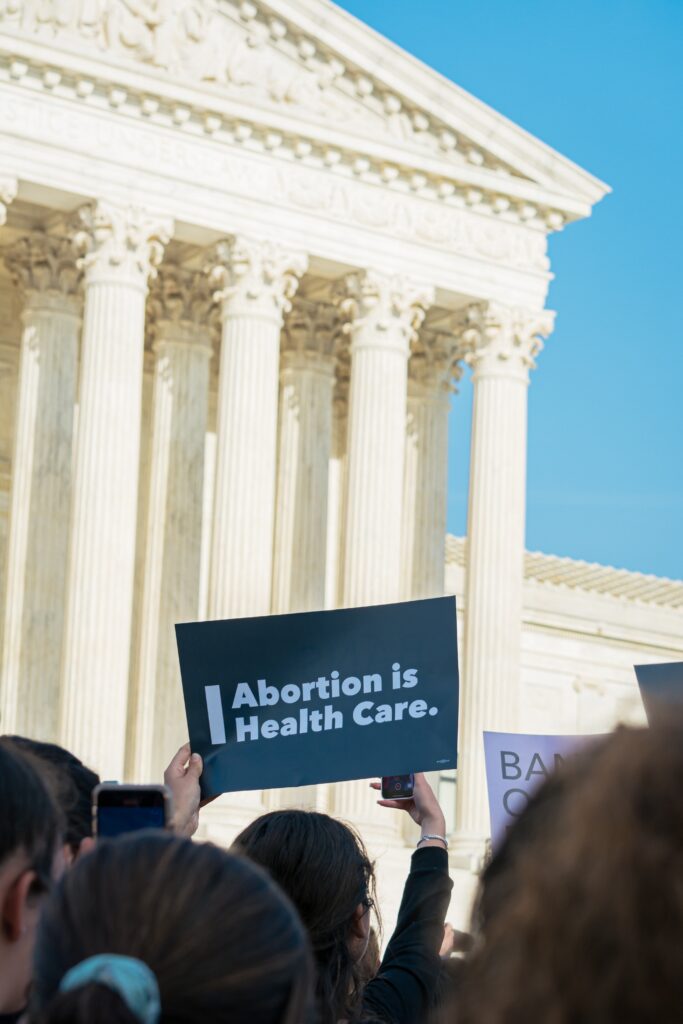By Sangeeta Kishore and Lauren Schulsohn
For our entire lives, and since our parents were teenagers, abortion has been legal in all fifty states. Abortion has always been a controversial topic throughout our youth. However, in the past few years, amid fueled rhetoric from the right, aggressive pro-life campaigning and political manipulation of the Supreme Court Justice nomination process, the decision to overturn Roe v. Wade today should not come as a surprise — and sadly, it’s just the beginning.
Before this ruling, pushback on abortion rights was already highly prevalent. Many states have already made it increasingly difficult to get access to an abortion, limiting the time frame a woman can get the procedure, requiring ultrasounds, and capping funding. However, the situation is about to get much worse. States will now be free to pass laws previously deemed unconstitutional, such as one in Georgia that does not allow women to get an abortion after fetal cardiac activity is present, which is approximately six weeks into the pregnancy. Following the Supreme Court’s decision today, Georgia Attorney General Chris Carr began asking the court to let the law take effect.
“If you are a woman in Georgia, you should be terrified right now,” said Stacey Abrams, former representative of Georgia, voting rights activist, and current candidate for Governor.
Already, abortion is now banned in at least nine states, including Kentucky, Louisana, South Dakota, Arkansas, Oklahoma and Utah. More states will continue to ban abortion in the coming days.
Thirteen states have already passed “trigger laws,” which would make most abortions illegal in the event of Roe’s overturning. In Texas, for example, their trigger law will take effect 30 days after the Supreme Court’s judgment on Roe v. Wade. In a statement immediately after today’s ruling, Texas Attorney General Ken Paxton declared abortion illegal in the state.
“Today, the question of abortion returns to the states,” Paxton said. “And in Texas, that question has already been answered: abortion is illegal here. I look forward to defending the pro-life laws of Texas and the lives of all unborn children moving forward.”
Although the Supreme Court issued an opinion, not a judgment, Paxton’s team said that the judgment would be issued a certain amount of time after parties are able to file an appeal motion.
Under the Texas trigger law, while the mother would not face civil or criminal liability, doctors would face up to life in prison and $100,000 for performing an abortion, with the sole exception being a threat to the woman’s life. People diagnosed with cancer while pregnant, sufferers of depression or other medical issues would not qualify for the exception.
Prior to today’s decision, the ruling’s majority opinion, authored by Justice Samuel Alito, was leaked in early May. While the conservative establishment and the fervent pro-life movement have been pushing for an end to the constitutional right to abortion since Roe’s ruling in1973, the legal basis for Alito’s opinion was more extreme than many anticipated. While not guaranteed directly by the Constitution, abortion was protected under “substantive due process.” As an originalist in Constitutional interpretation, Alito denounced the legitimacy of constitutional rights not “rooted in the Nation’s history and tradition,” such as the right to abortion, as illegitimate.
Another key facet of the opinion argues against the applicability of “stare decisis,” which enforces respect for the precedent set by previous decisions in future Supreme Court rulings. In his opinion, Alito wrote that “[s]tare decisis is not an inexorable command”. He continued that “[p]recedents should be respected, but sometimes the Court errs, and occasionally the Court issues an important decision that is egregiously wrong. When that happens, stare decisis is not a straitjacket.” Alito argues that Roe v. Wade and Planned Parenthood v. Casey, which upheld Roe’s ruling, were poorly reasoned, based on misinterpretations of history and clashed with other aspects of the law. In his view, the proper application of this principle calls for Roe’s overturning rather than its protection.
When the United States liberalized abortion laws nearly 50 years ago, it served as a model for other countries to ensure similar protections. According to Foreign Policy, at least 59 countries have expanded abortion access in the last three decades. Today, the United States has joined a group with 11 other countries, including three of its main adversaries, Russia, Iran and North Korea, who have rolled back reproductive rights and have placed increasing restrictions on abortion.
The United States has always been a beacon of hope and freedom that promotes human rights. Leaders of the free world look at the actions of the United States and are appalled and fearful of what it means. The First Minister of Scotland Nicola Sturgeon said today was one of the “darkest days for women’s rights in my lifetime.” Only time will tell how this action will seep into the politics of the global community.
According to a Quinnipiac poll, 63% of Americans believe that abortion should be legal in all or most cases as of September. A CNN poll reports a similar sentiment, with 69% of respondents opposing it being overturned. The majority of Americans support a woman’s right to choose and the existence of Roe v. Wade, yet as we too commonly see, the will of the American people is being ignored.
The overturning of Roe v. Wade does not mean an end to abortions in states instituting bans. It signals the end of safe and regulated abortions, with women now forced to travel long distances to a state where it is legally protected or when that is not possible, obtain an abortion illegally using unsafe methods.
The United States is facing a culture war and the decisions coming out of the Supreme Court this week represent this struggle. A portion of the country is eager to move forward to expand human rights, while others are looking to go backward and “Make America Great Again.” And although this push and pull between the past and the future have always been present in American politics and culture, the Supreme Court’s decision today will be the first time the court has taken away a right. And they don’t plan on stopping.
In Justice Clarence Thomas’ concurring opinion, he argued that “we should reconsider all of this Court’s substantive due process precedents, including Griswold, Lawrence, and Obergefell.” These decisions have prevented states from banning contraception, LGBTQ+ sex and same-sex marriage.
Martin Niemöller, a Lutheran pastor in Germany who spent seven years in a concentration camp, is most remembered for his post-war words:
First, they came for the socialists, and I did not speak out — because I was not a socialist.
Then they came for the trade unionists, and I did not speak out — because I was not a trade unionist.
Then they came for the Jews, and I did not speak out — because I was not a Jew.
Then they came for me — and there was no left to speak for me.
We have waited long enough to act. We simply cannot wait any longer.







